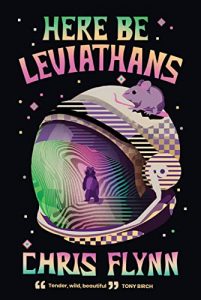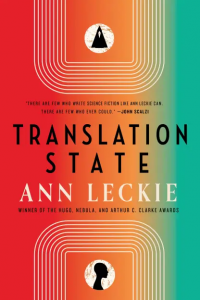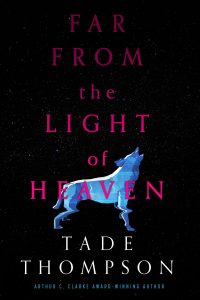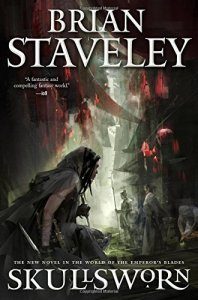Ian Mond Reviews Here Be Leviathans by Chris Flynn
 Here Be Leviathans, Chris Flynn (University of Queensland Press 978-0-70226-277-7, $A32.99, 240pp, tp) August 2022.
Here Be Leviathans, Chris Flynn (University of Queensland Press 978-0-70226-277-7, $A32.99, 240pp, tp) August 2022.
I first encountered the work of Chris Flynn with his third novel, Mammoth. Narrated by an American mastodon and including the viewpoints of a Tyrannosaurus bataar (not rex), a pterodactyl, a prehistoric penguin, and the severed hand of an Egyptian mummy, Mammoth tells the story of how these bones and fossilised remains came to be up for auction at the Natural History Museum in Manhattan (an event that actually transpired in 2007). As much as I enjoyed Mammoth – it’s funny and energetic, but laced with anger toward those who dig up and profit from the past – I wasn’t expecting eight of the nine stories in Flynn’s debut collection, Here Be Leviathans, to also be told from a nonhuman perspective, including those of a sabretooth tiger, a family of platypuses, a seat on an aeroplane, and a luxury boat. While it’s a bold move to lean so heavily on a single narrative device, in the case of Here Be Leviathans, it gives the reader that rare opportunity to consider a worldview not tainted by human desire and prejudice.
The grizzly bear who narrates the opening story, “Inheritance”, confesses from the get-go that he “ate a kid called Ash Tremblay yesterday. Parts of him, at least. The good bits. The crunchy skull, the brain, a juicy haunch.” Consequently, the bear – infused with Ash’s teenage memories (a side effect of eating humans) – is now on the run, hunted by the park ranger. “Inheritance” is a terrific start to the collection, an immensely entertaining and frequently funny cat and mouse – or bear and human – tale that’s also a poignant piece about memory and survival. The title story, “Here Be Leviathans”, also involves a hunt, but this time it’s obscenely rich humans tracking sabretooth tigers in an artificial enclosure al la Jurassic Park. Both “Inheritance” and “Here Be Leviathans” showcase Flynn’s skill at anthropomorphisation – the grizzly and Smilodon have human traits but retain their unique animal qualities – and his passion for the environment, an appreciation of a natural world where humanity is the invader. “Monotreme”, however, takes this anthropomorphising to the extreme, featuring a family of genetically modified talking (and swearing) platypuses, one of whom saves two German tourists from being eaten by a crocodile named Larry. Although the story has several funny moments – especially when the platypuses interrogate the German tourists about human sexuality – the overabundance of gags means that “Monotreme” is not as well balanced as the other “animal” stories. A piece that does find that sweet spot between humour and empathy is the wonderful and moving “Alas Poor Yorick”. Like Mammoth, the story is based on actual events, specifically the September 1951 launch of eleven mice and a monkey (named Albert Six but nicknamed Yorick) into space. By telling the story from Yorick’s perspective, Flynn makes the heartfelt and persuasive argument that non-human primates, both Russian and American, were the true pioneers of space travel.
The first piece to feature an inanimate object is “22F”. What begins as an absurdist workplace comedy narrated by an aeroplane seat abruptly becomes this white-knuckle story of a plane crash, described matter-of-factly in intricate detail. Of all the fiction I’ve read involving downed aeroplanes, this is up there as the most distressing. Not nearly as traumatic is “The Strait of Magellan”, despite being about a very contagious and deadly virus. The story is told from the viewpoint of a 70-metre luxury yacht that recounts the crew’s and guests’ attempts to avoid becoming infected (things, as you’d expect, go horribly wrong). Flynn’s cast of characters is sympathetically drawn – a major strength of his writing – but there’s little plot-wise that’s new here (speaking for myself, post-COVID, the bar for plague narratives has become incredibly high). It’s also the one piece in the collection that would have been as effective if narrated by a human. A story that works precisely because of its non-human perspective is the sentimental but never mawkish “A Beautiful and Unexpected Turn”, where a cheap hotel room chronicles its multiple encounters with a married couple over the years. I’m a romantic at heart, and as such, this is the story that brought me the closest to tears. Ironically, my least favourite piece is the only one in the collection narrated by a human. “Kiss Tomorrow Goodbye” involves a community of outsiders living in the ruins of what was once a Las Vegas casino. While I appreciated the tale’s idiosyncratic voice, I never truly connected to the characters or the setting.
Overall, though, Here Be Leviathans is an excellent debut collection. The stories are not just sprightly, clever and frequently laugh-out-loud funny; they also attempt to broaden our limited human perspective and remind us that not every narrative has to be about us.
Ian Mond loves to talk about books. For eight years he co-hosted a book podcast, The Writer and the Critic, with Kirstyn McDermott. Recently he has revived his blog, The Hysterical Hamster, and is again posting mostly vulgar reviews on an eclectic range of literary and genre novels. You can also follow Ian on Twitter (@Mondyboy) or contact him at mondyboy74@gmail.com.
This review and more like it in the December 2022 issue of Locus.
 While you are here, please take a moment to support Locus with a one-time or recurring donation. We rely on reader donations to keep the magazine and site going, and would like to keep the site paywall free, but WE NEED YOUR FINANCIAL SUPPORT to continue quality coverage of the science fiction and fantasy field.
While you are here, please take a moment to support Locus with a one-time or recurring donation. We rely on reader donations to keep the magazine and site going, and would like to keep the site paywall free, but WE NEED YOUR FINANCIAL SUPPORT to continue quality coverage of the science fiction and fantasy field.
©Locus Magazine. Copyrighted material may not be republished without permission of LSFF.








